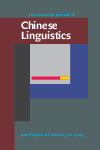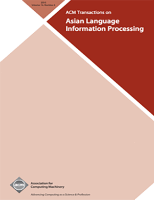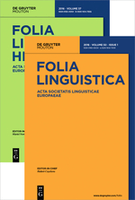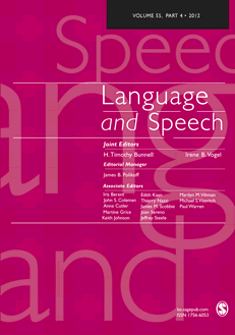
TRAITEMENT AUTOMATIQUE DES LANGUES
Scope & Guideline
Unveiling the Future of Language Technology
Introduction
Aims and Scopes
- Natural Language Processing Techniques:
The journal emphasizes the development and evaluation of NLP techniques, including machine translation, speech synthesis, and dialogue systems, contributing to the theoretical and practical aspects of language processing. - Interdisciplinary Applications:
Research published in the journal often explores the integration of language processing with other fields such as psychology, linguistics, and computer science, showcasing the multifaceted impact of NLP. - Ethical and Responsible AI:
There is a growing focus on the ethical implications and responsibilities associated with language technologies, including discussions on bias, fairness, and the legal aspects of machine translation. - Multimodal and Cross-modal Processing:
The journal includes studies on multimodal approaches that combine text with other data types (e.g., images, audio), reflecting the trend towards more integrated language understanding systems. - Linguistic Diversity and Low-Resource Languages:
A commitment to exploring linguistic diversity and low-resource languages is evident, as the journal publishes works addressing the challenges and methodologies for processing languages with limited resources.
Trending and Emerging
- Machine Learning and Deep Learning Innovations:
There is a significant increase in research focusing on advanced machine learning techniques, particularly deep learning models like Transformers, which are reshaping approaches to language tasks. - Ethics in AI and Language Processing:
An emerging trend is the focus on the ethical dimensions of language technologies, with discussions centering on bias in machine translation and responsible AI practices becoming increasingly prevalent. - Multimodal Processing and Interaction:
The rise of multimodal processing, which combines various forms of data (text, audio, visual), is gaining traction, reflecting the need for more holistic approaches to understanding human language. - Applications in Social Media and Informal Communication:
Research exploring language processing in social media contexts is on the rise, addressing how informal language and discourse can be effectively analyzed and understood. - Focus on Low-Resource Languages:
There is a growing emphasis on developing NLP tools and methodologies for low-resource and indigenous languages, indicating a commitment to linguistic diversity and inclusivity in language technology.
Declining or Waning
- Traditional Linguistic Theories:
While foundational linguistic theories have played a significant role in NLP, there is a noticeable decline in papers strictly adhering to traditional linguistic frameworks, as researchers increasingly favor data-driven and computational approaches. - Basic Language Processing Techniques:
Papers focusing solely on basic language processing techniques without innovative applications or integrations seem to be less frequent, indicating a shift towards more complex and integrated methodologies. - Narrow Domain Studies:
Research limited to very specific or narrow domains has decreased, possibly due to the journal's push towards broader applications that address wider societal and technological challenges.
Similar Journals

COMPUTATIONAL LINGUISTICS
Bridging Linguistics and Artificial IntelligenceCOMPUTATIONAL LINGUISTICS is a premier academic journal published by MIT Press, focusing on the intersection of linguistics and artificial intelligence. With the ISSN 0891-2017 and the E-ISSN 1530-9312, the journal serves as a key resource for researchers and practitioners in computational linguistics, a field that plays a crucial role in advancing language processing technologies. Since adopting an Open Access model in 2017, the journal has broadened its accessibility, encouraging a global exchange of ideas and research findings. It consistently ranks within the top quartiles of its respective fields, achieving Q1 status in Artificial Intelligence, Computer Science Applications, and Linguistics and Language as of 2023. This notable standing is further reflected in its Scopus rankings, placing it in the 99th percentile for Language and Linguistics, and maintaining a prestigious position in various computer science categories. The journal publishes cutting-edge research, theoretical frameworks, and practical applications, and aims to foster interdisciplinary collaboration among linguists, computer scientists, and AI specialists. As the field evolves, COMPUTATIONAL LINGUISTICS remains an essential platform for disseminating transformative ideas and pioneering work that shapes the future of language and technology.

Suvremena Lingvistika
Empowering Language Research Through Open Access.Suvremena Lingvistika is a distinguished open-access journal published by the Croatian Philological Society, dedicated to advancing research in the field of linguistics and language. Since its establishment, the journal has been pivotal in promoting scholarly dialogue within the linguistics community, especially among researchers and academics in Croatia and beyond. With an ISSN of 0586-0296 and an E-ISSN of 1847-117X, the journal has transitioned to an open-access model since 2007, ensuring that research is freely accessible to all. As of 2023, it holds a respectable Q3 ranking in the Linguistics and Language category, reflecting its potential contribution to the field. The journal's scope encompasses a wide array of linguistic disciplines, encouraging both theoretical and empirical studies. Supportive of new research, Suvremena Lingvistika aims to foster innovative approaches and methodologies in linguistics, making it an essential resource for students, researchers, and professionals eager to explore the complexities of language. With its ongoing publication until 2024, it continues to shape the linguistic landscape, providing valuable insights and fostering collaboration among scholars globally.

International Journal of Chinese Linguistics
Elevating Chinese Linguistics to Global StandardsInternational Journal of Chinese Linguistics is a distinguished publication that delves into various aspects of linguistic studies pertaining to the Chinese language. Published by John Benjamins Publishing Co, this journal stands out for its commitment to advancing the knowledge and understanding of Chinese linguistics within the global academic community. With an impact factor that places it in the Q2 quartile of linguistics and language, the journal is indexed in prominent databases, achieving ranks of #501 in Arts and Humanities and #580 in Social Sciences. These rankings reflect the journal's dedication to maintaining high scholarly standards and its relevance in both linguistic research and practical applications. While not categorized as Open Access, the journal provides necessary access through institutional subscriptions, thereby ensuring that valuable research reaches a broad audience. Covering a wide range of topics from syntax and phonetics to sociolinguistics and applied linguistics, the International Journal of Chinese Linguistics serves as an essential resource for researchers, professionals, and students seeking to deepen their understanding of the intricate relationship between language and culture in the Chinese context. With converging years from 2019 to 2024, it continues to evolve, reflecting ongoing developments in the field.

Language Resources and Evaluation
Bridging disciplines with cutting-edge language research.Language Resources and Evaluation, published by SPRINGER, is a leading peer-reviewed journal that focuses on the interdisciplinary field of language resources, evaluation, and their applications across various domains. With an impressive impact factor reflecting its academic rigor and influence in the fields of Education, Library and Information Sciences, Linguistics, and Language, this journal is categorized Q1 (2023) within these disciplines, underscoring its significance and high-quality contributions. Operating from the Netherlands, the journal has consistently delivered valuable insights since its inception in 1996, with ongoing publications continuing through 2024. Researchers and professionals are provided with open access options, fostering a global exchange of knowledge crucial for advancing the study and application of language technologies and resources. As it continues to rank exceptionally in Scopus, this journal serves as an essential platform for academics, offering a comprehensive understanding of the challenges and innovations in evaluating language resources.

ACM Transactions on Asian and Low-Resource Language Information Processing
Fostering collaboration in low-resource language research.ACM Transactions on Asian and Low-Resource Language Information Processing is a distinguished scholarly journal published by the Association for Computing Machinery (ACM), focusing on the processing of Asian and low-resource languages in the field of computer science. With an ISSN of 2375-4699 and an E-ISSN of 2375-4702, this journal serves as a vital platform for researchers and professionals dedicated to advancing language technology and natural language processing in underrepresented linguistic contexts. It has achieved a notable position in the academic community, ranking #94 out of 232 in the broader category of Computer Science with a 59th percentile ranking according to Scopus. As the journal converges on its comprehensive goals from 2015 to 2024, it emphasizes open debates and innovative methodologies to tackle challenges relevant to low-resource language processing. This commitment to publishing high-quality research, though it does not currently offer open access, ensures that the journal remains an essential resource for researchers, educators, and students striving to contribute to this dynamic field.

FOLIA LINGUISTICA
Innovating Insights in Linguistics and LanguageFOLIA LINGUISTICA, published by WALTER DE GRUYTER GMBH, is a premier scholarly journal dedicated to the field of linguistics. Established in 1967, the journal has consistently provided a platform for innovative research and scholarly discourse in language and linguistics, contributing significantly to the academic community's understanding of language structures, usage, and cognitive processes. With its classification in the top quartile (Q1) of linguistics and language in 2023, FOLIA LINGUISTICA holds a respectable rank (#282/1088) within the Arts and Humanities category and an admirable percentile rank of 74th, ensuring its position at the forefront of linguistic scholarship. Researchers and academics from around the globe can access a wealth of knowledge and cutting-edge research findings through this esteemed publication, which is vital for anyone looking to engage with the latest advancements in linguistics. Located in Berlin, Germany, FOLIA LINGUISTICA encompasses all aspects of language research, making it an indispensable resource for researchers, professionals, and students alike seeking to deepen their understanding of language and its complexities.

LANGUAGE AND SPEECH
Illuminating the Interplay Between Language and Human InteractionLANGUAGE AND SPEECH, published by SAGE PUBLICATIONS LTD, is a premier journal that serves the multifaceted realms of linguistics, speech science, and sociology. With a robust history of scholarly contribution since 1958 and an anticipated continuation through to 2024, the journal is recognized for its high-impact research, boasting a commendable impact factor and achieving Q1 ranking in both Linguistics and Sociology as well as Q2 in Medicine and Speech and Hearing categories as of 2023. The journal, available in both print and online formats with ISSN 0023-8309 and E-ISSN 1756-6053, provides a vital platform for interdisciplinary discourse among researchers, professionals, and students alike. Its rigorous review process and quality publications place it at the forefront of academic inquiry, offering critical insights that advance the understanding of language and its implications in various contexts. As a key resource in the field, LANGUAGE AND SPEECH continues to foster innovation and knowledge dissemination, making it an essential addition to the libraries of those committed to exploring the depths of communication sciences.

Linguistics Vanguard
Illuminating the complexities of human communication.Linguistics Vanguard is a premier academic journal dedicated to advancing research in the field of linguistics and language studies, published by the esteemed Walter de Gruyter GmbH. With its impact factor placing it in the Q1 category for Linguistics and Language as of 2023, the journal demonstrates a significant influence in the academic community, boasting a Scopus rank of #194 out of 1088 in Arts and Humanities and a commendable percentile of 82. Since its inception in 2015, the journal has served as a critical platform for disseminating innovative research and fostering dialogue among scholars and practitioners, encapsulating a wide range of topics within linguistics. Despite being a subscription-based publication, it maintains an open approach to scholarship, encouraging robust academic exchange. Located in Berlin, Germany, at Genthiner Strasse 13, D-10785, Linguistics Vanguard is a must-read for those seeking to stay at the forefront of linguistic research and theory.

Yuyan Kexue-Linguistic Sciences
Illuminating Language Through Interdisciplinary InsightsYuyan Kexue-Linguistic Sciences, published by SCIENCE PRESS, is a pivotal academic journal dedicated to the field of linguistics. With its ISSN of 1671-9484, this journal seeks to explore and illuminate various linguistic phenomena, contributing significantly to the understanding of language in both theoretical and applied contexts. Emphasizing interdisciplinary research, it welcomes contributions that bridge linguistics with areas such as cognitive science, sociology, and communication studies. Although it currently does not offer open access, Yuyan Kexue-Linguistic Sciences aims to provide a platform for researchers, professionals, and students alike to engage with cutting-edge studies and emerging trends in linguistics. Its publication location in Beijing positions it as a vital contributor to the global discourse in the linguistic sciences, catering to both a national and international audience. As the journal continues to grow, it aspires to maintain high academic standards and foster scholarly exchange for years to come.

Annual Review of Linguistics
Elevating Linguistic Scholarship to New HeightsAnnual Review of Linguistics is a premier scholarly journal dedicated to advancing the field of linguistics through comprehensive and insightful reviews of current research and emerging trends. Published by ANNUAL REVIEWS, this journal is recognized for its high impact, evidenced by its Q1 ranking in the Linguistics and Language category and exceptional placements in the Scopus Ranks, positioning it in the top 2% of its field. Since its inception in 2015, the journal has served as a vital resource for researchers, professionals, and students seeking to deepen their understanding of language theories, acquisition, processing, and sociolinguistics. With no Open Access currently available, the Annual Review of Linguistics is esteemed for its rigorous peer-reviewed articles that synthesize a wealth of knowledge, making it an indispensable tool for advancing research and dialogue within the linguistic community.